-
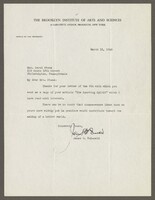 James G. McDonald letter to Carol Stone [Caroline Katzenstein], 12 March 1940
James G. McDonald letter to Carol Stone [Caroline Katzenstein], 12 March 1940 Caroline Katzenstein was a prominent suffragist in the years leading up to the Nineteenth Amendment. In addition to her continued support for the Equal Rights Amendment, Katzenstein spent much of her time writing essays and articles under the pseudonym Carol Stone. Her 1939 essay, "The Sporting Spirit," documents her utopian ideals and urges her readers to think in terms of individual morality for the common good. She disseminated her essay to dozens of the most luminous academics and political figures of the time. This letter is from James G. McDonald, a United States ambassador and president of the Brooklyn Institute of Arts and Sciences.
-
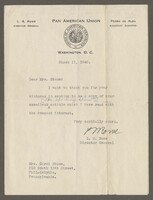 L. S. Rowe letter to Carol Stone [Caroline Katzenstein], 11 March 1940
L. S. Rowe letter to Carol Stone [Caroline Katzenstein], 11 March 1940 Caroline Katzenstein was a prominent suffragist in the years leading up to the Nineteenth Amendment. In addition to her continued support for the Equal Rights Amendment, Katzenstein spent much of her time writing essays and articles under the pseudonym Carol Stone. Her 1939 essay, "The Sporting Spirit," documents her utopian ideals and urges her readers to think in terms of individual morality for the common good. She disseminated her essay to dozens of the most luminous academics and political figures of the time. This letter is from Leo Stanton Rowe, director of the Pan American Union.
-
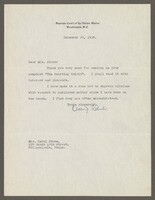 Owen Joseph Roberts letter to Carol Stone [Caroline Katzenstein], 30 December 1939
Owen Joseph Roberts letter to Carol Stone [Caroline Katzenstein], 30 December 1939 Caroline Katzenstein was a prominent suffragist in the years leading up to the Nineteenth Amendment. In addition to her continued support for the Equal Rights Amendment, Katzenstein spent much of her time writing essays and articles under the pseudonym Carol Stone. Her 1939 essay, "The Sporting Spirit," documents her utopian ideals and urges her readers to think in terms of individual morality for the common good. She disseminated her essay to dozens of the most luminous academics and political figures of the time. This letter is from Owen Roberts, an Associate Justice of the United States Supreme Court.
-
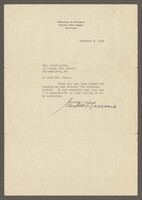 Wendell L. Willkie letter to Carol Stone [Caroline Katzenstein], 8 December 1939
Wendell L. Willkie letter to Carol Stone [Caroline Katzenstein], 8 December 1939 Caroline Katzenstein was a prominent suffragist in the years leading up to the Nineteenth Amendment. In addition to her continued support for the Equal Rights Amendment, Katzenstein spent much of her time writing essays and articles under the pseudonym Carol Stone. Her 1939 essay, "The Sporting Spirit," documents her utopian ideals and urges her readers to think in terms of individual morality for the common good. She disseminated her essay to dozens of the most luminous academics and political figures of the time. This letter was sent from Wendell L. Willkie, a lawyer and the 1940 Republican nominee for President.
-
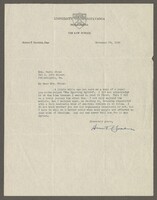 Herbert F. Goodrich letter to Carol Stone [Caroline Katzenstein], 29 November 1939
Herbert F. Goodrich letter to Carol Stone [Caroline Katzenstein], 29 November 1939 Caroline Katzenstein was a prominent suffragist in the years leading up to the Nineteenth Amendment. In addition to her continued support for the Equal Rights Amendment, Katzenstein spent much of her time writing essays and articles under the pseudonym Carol Stone. Her 1939 essay, "The Sporting Spirit," documents her utopian ideals and urges her readers to think in terms of individual morality for the common good. She disseminated her essay to dozens of the most luminous academics and political figures of the time. This letter is from Herbert Funk Goodrich, a Circuit Judge of the United States Court of Appeals and Dean of the University of Pennsylvania Law School.
-
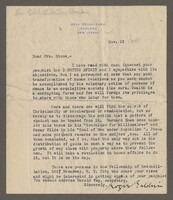 Roger Nash Baldwin letter to Carol Stone [Caroline Katzenstein], 25 November 1939
Roger Nash Baldwin letter to Carol Stone [Caroline Katzenstein], 25 November 1939 Caroline Katzenstein was a prominent suffragist in the years leading up to the Nineteenth Amendment. In addition to her continued support for the Equal Rights Amendment, Katzenstein spent much of her time writing essays and articles under the pseudonym Carol Stone. Her 1939 essay, "The Sporting Spirit," documents her utopian ideals and urges her readers to think in terms of individual morality for the common good. She disseminated her essay to dozens of the most luminous academics and political figures of the time. This letter is from Roger Nash Brown, one of the founders of the American Civil Liberties Union.
-
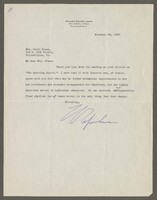 William Draper Lewis letter to Carol Stone [Caroline Katzenstein], 22 November 1939
William Draper Lewis letter to Carol Stone [Caroline Katzenstein], 22 November 1939 Caroline Katzenstein was a prominent suffragist in the years leading up to the Nineteenth Amendment. In addition to her continued support for the Equal Rights Amendment, Katzenstein spent much of her time writing essays and articles under the pseudonym Carol Stone. Her 1939 essay, "The Sporting Spirit," documents her utopian ideals and urges her readers to think in terms of individual morality for the common good. She disseminated her essay to dozens of the most luminous academics and political figures of the time. This letter is from William Draper Lewis, the first full-time dean of the University of Pennsylvania Law School.
-
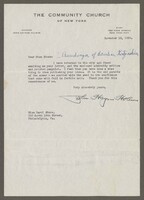 John Haynes Holmes letter to Carol tone [Caroline Katzenstein], 15 September 1939
John Haynes Holmes letter to Carol tone [Caroline Katzenstein], 15 September 1939 Caroline Katzenstein was a prominent suffragist in the years leading up to the Nineteenth Amendment. In addition to her continued support for the Equal Rights Amendment, Katzenstein spent much of her time writing essays and articles under the pseudonym Carol Stone. Her 1939 essay, "The Sporting Spirit," documents her utopian ideals and urges her readers to think in terms of individual morality for the common good. She disseminated her essay to dozens of the most luminous academics and political figures of the time. This letter is from John Haynes Holmes, minister of the Community Church of New York.
-
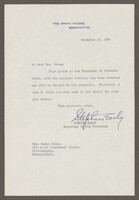 Stephen Early letter to Carol Stone [Caroline Katzenstein], 13 November 1939
Stephen Early letter to Carol Stone [Caroline Katzenstein], 13 November 1939 Caroline Katzenstein was a prominent suffragist in the years leading up to the Nineteenth Amendment. In addition to her continued support for the Equal Rights Amendment, Katzenstein spent much of her time writing essays and articles under the pseudonym Carol Stone. Her 1939 essay, "The Sporting Spirit," documents her utopian ideals and urges her readers to think in terms of individual morality for the common good. She disseminated her essay to dozens of the most luminous academics and political figures of the time. This letter is from Stephen Early, who served as White House Press Secretary under Franklin D. Roosevelt from 1933 to 1945.
-
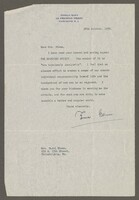 Thomas Mann letter to Carole Stone [Caroline Katzenstein], 28 October 1939
Thomas Mann letter to Carole Stone [Caroline Katzenstein], 28 October 1939 Caroline Katzenstein was a prominent suffragist in the years leading up to the Nineteenth Amendment. In addition to her continued support for the Equal Rights Amendment, Katzenstein spent much of her time writing essays and articles under the pseudonym Carol Stone. Her 1939 essay, "The Sporting Spirit," documents her utopian ideals and urges her readers to think in terms of individual morality for the common good. She disseminated her essay to dozens of the most luminous academics and political figures of the time. This letter is from Thomas Mann, a German novelist and winner of the 1929 Nobel Prize in Literature.
-
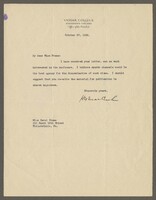 Henry Noble MacCracken letter to Carol Stone [Caroline Katzenstein], 27 October 1939
Henry Noble MacCracken letter to Carol Stone [Caroline Katzenstein], 27 October 1939 Caroline Katzenstein was a prominent suffragist in the years leading up to the Nineteenth Amendment. In addition to her continued support for the Equal Rights Amendment, Katzenstein spent much of her time writing essays and articles under the pseudonym Carol Stone. Her 1939 essay, "The Sporting Spirit," documents her utopian ideals and urges her readers to think in terms of individual morality for the common good. She disseminated her essay to dozens of the most luminous academics and political figures of the time. This letter is from Henry Noble MacCracken, president of Vassar College.
-
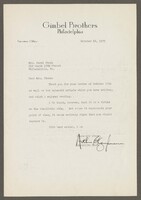 Arthur C. Kaufmann letter to Carol Stone, 16 October 1939
Arthur C. Kaufmann letter to Carol Stone, 16 October 1939 Caroline Katzenstein was a prominent suffragist in the years leading up to the Nineteenth Amendment. In addition to her continued support for the Equal Rights Amendment, Katzenstein spent much of her time writing essays and articles under the pseudonym Carol Stone. Her 1939 essay, "The Sporting Spirit," documents her utopian ideals and urges her readers to think in terms of individual morality for the common good. She disseminated her essay to dozens of the most luminous academics and political figures of the time. This letter is from Arthur Kaufmann, chief executive of Gimbels.
-
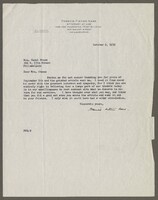 Francis Fisher Kane letter to Carol Stone [Caroline Katzenstein], 6 October 1939
Francis Fisher Kane letter to Carol Stone [Caroline Katzenstein], 6 October 1939 Caroline Katzenstein was a prominent suffragist in the years leading up to the Nineteenth Amendment. In addition to her continued support for the Equal Rights Amendment, Katzenstein spent much of her time writing essays and articles under the pseudonym Carol Stone. Her 1939 essay, "The Sporting Spirit," documents her utopian ideals and urges her readers to think in terms of individual morality for the common good. She disseminated her essay to dozens of the most luminous academics and political figures of the time. This letter is from Francis Fisher Kane, U.S. Attorney for the Eastern District of Pennsylvania.
-
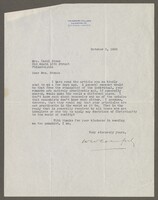 W. W. Comfort letter to Carol Stone [Caroline Katzenstein], 2 October 1939
W. W. Comfort letter to Carol Stone [Caroline Katzenstein], 2 October 1939 Caroline Katzenstein was a prominent suffragist in the years leading up to the Nineteenth Amendment. In addition to her continued support for the Equal Rights Amendment, Katzenstein spent much of her time writing essays and articles under the pseudonym Carol Stone. Her 1939 essay, "The Sporting Spirit," documents her utopian ideals and urges her readers to think in terms of individual morality for the common good. She disseminated her essay to dozens of the most luminous academics and political figures of the time. This letter is from William Wistar Comfort, president of Haverford College.
-
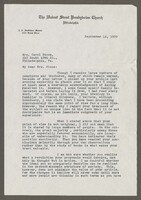 J. A. MacCallum letter to Carol Stone [Caroline Katzenstein], 14 September 1939
J. A. MacCallum letter to Carol Stone [Caroline Katzenstein], 14 September 1939 Caroline Katzenstein was a prominent suffragist in the years leading up to the Nineteenth Amendment. In addition to her continued support for the Equal Rights Amendment, Katzenstein spent much of her time writing essays and articles under the pseudonym Carol Stone. Her 1939 essay, "The Sporting Spirit," documents her utopian ideals and urges her readers to think in terms of individual morality for the common good. She disseminated her essay to dozens of the most luminous academics and political figures of the time. This letter was from J.A. MacCallum, a minister of the Walnut Street Presbyterian Church of Philadelphia.
-
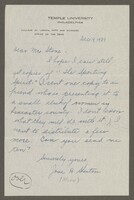 Jane D. Shenton letter to Carol Stone [Caroline Katzenstein], 9 December 1939
Jane D. Shenton letter to Carol Stone [Caroline Katzenstein], 9 December 1939 Caroline Katzenstein was a prominent suffragist in the years leading up to the Nineteenth Amendment. In addition to her continued support for the Equal Rights Amendment, Katzenstein spent much of her time writing essays and articles under the pseudonym Carol Stone. Her 1939 essay, "The Sporting Spirit," documents her utopian ideals and urges her readers to think in terms of individual morality for the common good. She disseminated her essay to dozens of the most luminous academics and political figures of the time. This letter is from Jane D. Shenton, assistant to the dean of the College of Liberal Arts at Temple University.
-
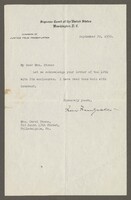 Felix Frankfurter letter to Carol Stone [Caroline Katzenstein], 28 September 1939
Felix Frankfurter letter to Carol Stone [Caroline Katzenstein], 28 September 1939 Caroline Katzenstein was a prominent suffragist in the years leading up to the Nineteenth Amendment. In addition to her continued support for the Equal Rights Amendment, Katzenstein spent much of her time writing essays and articles under the pseudonym Carol Stone. Her 1939 essay, "The Sporting Spirit," documents her utopian ideals and urges her readers to think in terms of individual morality for the common good. She disseminated her essay to dozens of the most luminous academics and political figures of the time. This letter is from Felix Frankfurter, Associate Justice of the Supreme Court of the United States.
-
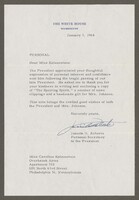 Juanita D. Roberts letter to Caroline Katzenstein, 7 January 1964
Juanita D. Roberts letter to Caroline Katzenstein, 7 January 1964 Caroline Katzenstein was a prominent suffragist in the years leading up to the Nineteenth Amendment. In addition to her continued support for the Equal Rights Amendment, Katzenstein spent much of her time writing essays and articles under the pseudonym Carol Stone. Her 1939 essay, "The Sporting Spirit," documents her utopian ideals and urges her readers to think in terms of individual morality for the common good. She disseminated her essay to dozens of the most luminous academics and political figures of the time. This letter is from Juanita Roberts, the principal secretary and confidant of Lyndon B. Johnson.
-
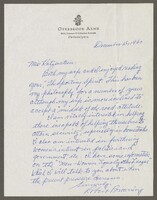 Robert Browning letter to Caroline Katzenstein, 15 December 1960
Robert Browning letter to Caroline Katzenstein, 15 December 1960 Caroline Katzenstein was a prominent suffragist in the years leading up to the Nineteenth Amendment. In addition to her continued support for the Equal Rights Amendment, Katzenstein spent much of her time writing essays and articles under the pseudonym Carol Stone. Her 1939 essay, "The Sporting Spirit," documents her utopian ideals and urges her readers to think in terms of individual morality for the common good. She disseminated her essay to dozens of the most luminous academics and political figures of the time. This letter is from a neighbor who received a copy of Katzenstein's essay.
-
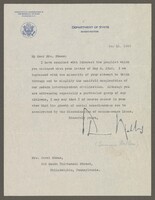 Sumner Welles letter to Carol Stone [Caroline Katzenstein], 11 May 1940
Sumner Welles letter to Carol Stone [Caroline Katzenstein], 11 May 1940 Caroline Katzenstein was a prominent suffragist in the years leading up to the Nineteenth Amendment. In addition to her continued support for the Equal Rights Amendment, Katzenstein spent much of her time writing essays and articles under the pseudonym Carol Stone. Her 1939 essay, "The Sporting Spirit," documents her utopian ideals and urges her readers to think in terms of individual morality for the common good. She disseminated her essay to dozens of the most luminous academics and political figures of the time. This letter is from Sumner Milles, an American diplomat and Under Secretary of State.
-
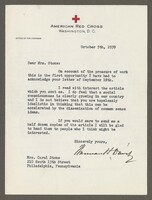 Norman H. Davis letter to Carol Stone [Caroline Katzenstein], 5 October 1939
Norman H. Davis letter to Carol Stone [Caroline Katzenstein], 5 October 1939 Caroline Katzenstein was a prominent suffragist in the years leading up to the Nineteenth Amendment. In addition to her continued support for the Equal Rights Amendment, Katzenstein spent much of her time writing essays and articles under the pseudonym Carol Stone. Her 1939 essay, "The Sporting Spirit," documents her utopian ideals and urges her readers to think in terms of individual morality for the common good. She disseminated her essay to dozens of the most luminous academics and political figures of the time. This letter is from Norman Davis, an American diplomat and Chairman of the Red Cross.
-
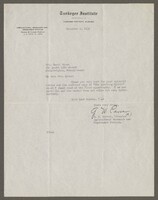 G.W. Carver letter to Carol Stone [Caroline Katzenstein], 2 December 1939
G.W. Carver letter to Carol Stone [Caroline Katzenstein], 2 December 1939 Caroline Katzenstein was a prominent suffragist in the years leading up to the Nineteenth Amendment. In addition to her continued support for the Equal Rights Amendment, Katzenstein spent much of her time writing essays and articles under the pseudonym Carol Stone. Her 1939 essay, "The Sporting Spirit," documents her utopian ideals and urges her readers to think in terms of individual morality for the common good. She disseminated her essay to dozens of the most luminous academics and political figures of the time. This letter is from George Washington Carver, an agricultural scientist and a professor at the Tuskegee Institute.
-
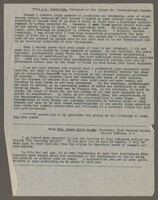 Reactions to The Sporting Spirit, undated
Reactions to The Sporting Spirit, undated Caroline Katzenstein was a prominent suffragist in the years leading up to the Nineteenth Amendment. In addition to her continued support for the Equal Rights Amendment, Katzenstein spent much of her time writing essays and articles under the pseudonym Carol Stone. Her 1939 essay, "The Sporting Spirit," documents her utopian ideals and urges her readers to think in terms of individual morality for the common good. She disseminated her essay to dozens of the most luminous academics and political figures of the time. This document is a partial collation of responses Katzenstein received from her readers.
-
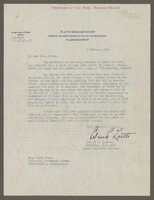 Leland P. Lovette letter to Carol Stone [Caroline Katzenstein], 2 February 1940
Leland P. Lovette letter to Carol Stone [Caroline Katzenstein], 2 February 1940 Caroline Katzenstein was a prominent suffragist in the years leading up to the Nineteenth Amendment. In addition to her continued support for the Equal Rights Amendment, Katzenstein spent much of her time writing essays and articles under the pseudonym Carol Stone. Her 1939 essay, "The Sporting Spirit," documents her utopian ideals and urges her readers to think in terms of individual morality for the common good. She disseminated her essay to dozens of the most luminous academics and political figures of the time. This letter was from Leland Lovette, public relations officer of the Secretary of the Navy, Charles Edison. On the reverse is a copy of Katzenstein's response to Commander Lovette.
-
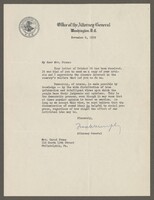 Frank Murphy letter to Carol Stone [Caroline Katzenstein], 6 November 1939
Frank Murphy letter to Carol Stone [Caroline Katzenstein], 6 November 1939 Caroline Katzenstein was a prominent suffragist in the years leading up to the Nineteenth Amendment. In addition to her continued support for the Equal Rights Amendment, Katzenstein spent much of her time writing essays and articles under the pseudonym Carol Stone. Her 1939 essay, "The Sporting Spirit," documents her utopian ideals and urges her readers to think in terms of individual morality for the common good. She disseminated her essay to dozens of the most luminous academics and political figures of the time. This letter was from Frank Murphy, the United States Attorney General from 1939 to 1940, and later a Supreme Court Justice.
 James G. McDonald letter to Carol Stone [Caroline Katzenstein], 12 March 1940 Caroline Katzenstein was a prominent suffragist in the years leading up to the Nineteenth Amendment. In addition to her continued support for the Equal Rights Amendment, Katzenstein spent much of her time writing essays and articles under the pseudonym Carol Stone. Her 1939 essay, "The Sporting Spirit," documents her utopian ideals and urges her readers to think in terms of individual morality for the common good. She disseminated her essay to dozens of the most luminous academics and political figures of the time. This letter is from James G. McDonald, a United States ambassador and president of the Brooklyn Institute of Arts and Sciences.
James G. McDonald letter to Carol Stone [Caroline Katzenstein], 12 March 1940 Caroline Katzenstein was a prominent suffragist in the years leading up to the Nineteenth Amendment. In addition to her continued support for the Equal Rights Amendment, Katzenstein spent much of her time writing essays and articles under the pseudonym Carol Stone. Her 1939 essay, "The Sporting Spirit," documents her utopian ideals and urges her readers to think in terms of individual morality for the common good. She disseminated her essay to dozens of the most luminous academics and political figures of the time. This letter is from James G. McDonald, a United States ambassador and president of the Brooklyn Institute of Arts and Sciences. L. S. Rowe letter to Carol Stone [Caroline Katzenstein], 11 March 1940 Caroline Katzenstein was a prominent suffragist in the years leading up to the Nineteenth Amendment. In addition to her continued support for the Equal Rights Amendment, Katzenstein spent much of her time writing essays and articles under the pseudonym Carol Stone. Her 1939 essay, "The Sporting Spirit," documents her utopian ideals and urges her readers to think in terms of individual morality for the common good. She disseminated her essay to dozens of the most luminous academics and political figures of the time. This letter is from Leo Stanton Rowe, director of the Pan American Union.
L. S. Rowe letter to Carol Stone [Caroline Katzenstein], 11 March 1940 Caroline Katzenstein was a prominent suffragist in the years leading up to the Nineteenth Amendment. In addition to her continued support for the Equal Rights Amendment, Katzenstein spent much of her time writing essays and articles under the pseudonym Carol Stone. Her 1939 essay, "The Sporting Spirit," documents her utopian ideals and urges her readers to think in terms of individual morality for the common good. She disseminated her essay to dozens of the most luminous academics and political figures of the time. This letter is from Leo Stanton Rowe, director of the Pan American Union. Owen Joseph Roberts letter to Carol Stone [Caroline Katzenstein], 30 December 1939 Caroline Katzenstein was a prominent suffragist in the years leading up to the Nineteenth Amendment. In addition to her continued support for the Equal Rights Amendment, Katzenstein spent much of her time writing essays and articles under the pseudonym Carol Stone. Her 1939 essay, "The Sporting Spirit," documents her utopian ideals and urges her readers to think in terms of individual morality for the common good. She disseminated her essay to dozens of the most luminous academics and political figures of the time. This letter is from Owen Roberts, an Associate Justice of the United States Supreme Court.
Owen Joseph Roberts letter to Carol Stone [Caroline Katzenstein], 30 December 1939 Caroline Katzenstein was a prominent suffragist in the years leading up to the Nineteenth Amendment. In addition to her continued support for the Equal Rights Amendment, Katzenstein spent much of her time writing essays and articles under the pseudonym Carol Stone. Her 1939 essay, "The Sporting Spirit," documents her utopian ideals and urges her readers to think in terms of individual morality for the common good. She disseminated her essay to dozens of the most luminous academics and political figures of the time. This letter is from Owen Roberts, an Associate Justice of the United States Supreme Court. Wendell L. Willkie letter to Carol Stone [Caroline Katzenstein], 8 December 1939 Caroline Katzenstein was a prominent suffragist in the years leading up to the Nineteenth Amendment. In addition to her continued support for the Equal Rights Amendment, Katzenstein spent much of her time writing essays and articles under the pseudonym Carol Stone. Her 1939 essay, "The Sporting Spirit," documents her utopian ideals and urges her readers to think in terms of individual morality for the common good. She disseminated her essay to dozens of the most luminous academics and political figures of the time. This letter was sent from Wendell L. Willkie, a lawyer and the 1940 Republican nominee for President.
Wendell L. Willkie letter to Carol Stone [Caroline Katzenstein], 8 December 1939 Caroline Katzenstein was a prominent suffragist in the years leading up to the Nineteenth Amendment. In addition to her continued support for the Equal Rights Amendment, Katzenstein spent much of her time writing essays and articles under the pseudonym Carol Stone. Her 1939 essay, "The Sporting Spirit," documents her utopian ideals and urges her readers to think in terms of individual morality for the common good. She disseminated her essay to dozens of the most luminous academics and political figures of the time. This letter was sent from Wendell L. Willkie, a lawyer and the 1940 Republican nominee for President. Herbert F. Goodrich letter to Carol Stone [Caroline Katzenstein], 29 November 1939 Caroline Katzenstein was a prominent suffragist in the years leading up to the Nineteenth Amendment. In addition to her continued support for the Equal Rights Amendment, Katzenstein spent much of her time writing essays and articles under the pseudonym Carol Stone. Her 1939 essay, "The Sporting Spirit," documents her utopian ideals and urges her readers to think in terms of individual morality for the common good. She disseminated her essay to dozens of the most luminous academics and political figures of the time. This letter is from Herbert Funk Goodrich, a Circuit Judge of the United States Court of Appeals and Dean of the University of Pennsylvania Law School.
Herbert F. Goodrich letter to Carol Stone [Caroline Katzenstein], 29 November 1939 Caroline Katzenstein was a prominent suffragist in the years leading up to the Nineteenth Amendment. In addition to her continued support for the Equal Rights Amendment, Katzenstein spent much of her time writing essays and articles under the pseudonym Carol Stone. Her 1939 essay, "The Sporting Spirit," documents her utopian ideals and urges her readers to think in terms of individual morality for the common good. She disseminated her essay to dozens of the most luminous academics and political figures of the time. This letter is from Herbert Funk Goodrich, a Circuit Judge of the United States Court of Appeals and Dean of the University of Pennsylvania Law School. Roger Nash Baldwin letter to Carol Stone [Caroline Katzenstein], 25 November 1939 Caroline Katzenstein was a prominent suffragist in the years leading up to the Nineteenth Amendment. In addition to her continued support for the Equal Rights Amendment, Katzenstein spent much of her time writing essays and articles under the pseudonym Carol Stone. Her 1939 essay, "The Sporting Spirit," documents her utopian ideals and urges her readers to think in terms of individual morality for the common good. She disseminated her essay to dozens of the most luminous academics and political figures of the time. This letter is from Roger Nash Brown, one of the founders of the American Civil Liberties Union.
Roger Nash Baldwin letter to Carol Stone [Caroline Katzenstein], 25 November 1939 Caroline Katzenstein was a prominent suffragist in the years leading up to the Nineteenth Amendment. In addition to her continued support for the Equal Rights Amendment, Katzenstein spent much of her time writing essays and articles under the pseudonym Carol Stone. Her 1939 essay, "The Sporting Spirit," documents her utopian ideals and urges her readers to think in terms of individual morality for the common good. She disseminated her essay to dozens of the most luminous academics and political figures of the time. This letter is from Roger Nash Brown, one of the founders of the American Civil Liberties Union. William Draper Lewis letter to Carol Stone [Caroline Katzenstein], 22 November 1939 Caroline Katzenstein was a prominent suffragist in the years leading up to the Nineteenth Amendment. In addition to her continued support for the Equal Rights Amendment, Katzenstein spent much of her time writing essays and articles under the pseudonym Carol Stone. Her 1939 essay, "The Sporting Spirit," documents her utopian ideals and urges her readers to think in terms of individual morality for the common good. She disseminated her essay to dozens of the most luminous academics and political figures of the time. This letter is from William Draper Lewis, the first full-time dean of the University of Pennsylvania Law School.
William Draper Lewis letter to Carol Stone [Caroline Katzenstein], 22 November 1939 Caroline Katzenstein was a prominent suffragist in the years leading up to the Nineteenth Amendment. In addition to her continued support for the Equal Rights Amendment, Katzenstein spent much of her time writing essays and articles under the pseudonym Carol Stone. Her 1939 essay, "The Sporting Spirit," documents her utopian ideals and urges her readers to think in terms of individual morality for the common good. She disseminated her essay to dozens of the most luminous academics and political figures of the time. This letter is from William Draper Lewis, the first full-time dean of the University of Pennsylvania Law School. John Haynes Holmes letter to Carol tone [Caroline Katzenstein], 15 September 1939 Caroline Katzenstein was a prominent suffragist in the years leading up to the Nineteenth Amendment. In addition to her continued support for the Equal Rights Amendment, Katzenstein spent much of her time writing essays and articles under the pseudonym Carol Stone. Her 1939 essay, "The Sporting Spirit," documents her utopian ideals and urges her readers to think in terms of individual morality for the common good. She disseminated her essay to dozens of the most luminous academics and political figures of the time. This letter is from John Haynes Holmes, minister of the Community Church of New York.
John Haynes Holmes letter to Carol tone [Caroline Katzenstein], 15 September 1939 Caroline Katzenstein was a prominent suffragist in the years leading up to the Nineteenth Amendment. In addition to her continued support for the Equal Rights Amendment, Katzenstein spent much of her time writing essays and articles under the pseudonym Carol Stone. Her 1939 essay, "The Sporting Spirit," documents her utopian ideals and urges her readers to think in terms of individual morality for the common good. She disseminated her essay to dozens of the most luminous academics and political figures of the time. This letter is from John Haynes Holmes, minister of the Community Church of New York. Stephen Early letter to Carol Stone [Caroline Katzenstein], 13 November 1939 Caroline Katzenstein was a prominent suffragist in the years leading up to the Nineteenth Amendment. In addition to her continued support for the Equal Rights Amendment, Katzenstein spent much of her time writing essays and articles under the pseudonym Carol Stone. Her 1939 essay, "The Sporting Spirit," documents her utopian ideals and urges her readers to think in terms of individual morality for the common good. She disseminated her essay to dozens of the most luminous academics and political figures of the time. This letter is from Stephen Early, who served as White House Press Secretary under Franklin D. Roosevelt from 1933 to 1945.
Stephen Early letter to Carol Stone [Caroline Katzenstein], 13 November 1939 Caroline Katzenstein was a prominent suffragist in the years leading up to the Nineteenth Amendment. In addition to her continued support for the Equal Rights Amendment, Katzenstein spent much of her time writing essays and articles under the pseudonym Carol Stone. Her 1939 essay, "The Sporting Spirit," documents her utopian ideals and urges her readers to think in terms of individual morality for the common good. She disseminated her essay to dozens of the most luminous academics and political figures of the time. This letter is from Stephen Early, who served as White House Press Secretary under Franklin D. Roosevelt from 1933 to 1945. Thomas Mann letter to Carole Stone [Caroline Katzenstein], 28 October 1939 Caroline Katzenstein was a prominent suffragist in the years leading up to the Nineteenth Amendment. In addition to her continued support for the Equal Rights Amendment, Katzenstein spent much of her time writing essays and articles under the pseudonym Carol Stone. Her 1939 essay, "The Sporting Spirit," documents her utopian ideals and urges her readers to think in terms of individual morality for the common good. She disseminated her essay to dozens of the most luminous academics and political figures of the time. This letter is from Thomas Mann, a German novelist and winner of the 1929 Nobel Prize in Literature.
Thomas Mann letter to Carole Stone [Caroline Katzenstein], 28 October 1939 Caroline Katzenstein was a prominent suffragist in the years leading up to the Nineteenth Amendment. In addition to her continued support for the Equal Rights Amendment, Katzenstein spent much of her time writing essays and articles under the pseudonym Carol Stone. Her 1939 essay, "The Sporting Spirit," documents her utopian ideals and urges her readers to think in terms of individual morality for the common good. She disseminated her essay to dozens of the most luminous academics and political figures of the time. This letter is from Thomas Mann, a German novelist and winner of the 1929 Nobel Prize in Literature. Henry Noble MacCracken letter to Carol Stone [Caroline Katzenstein], 27 October 1939 Caroline Katzenstein was a prominent suffragist in the years leading up to the Nineteenth Amendment. In addition to her continued support for the Equal Rights Amendment, Katzenstein spent much of her time writing essays and articles under the pseudonym Carol Stone. Her 1939 essay, "The Sporting Spirit," documents her utopian ideals and urges her readers to think in terms of individual morality for the common good. She disseminated her essay to dozens of the most luminous academics and political figures of the time. This letter is from Henry Noble MacCracken, president of Vassar College.
Henry Noble MacCracken letter to Carol Stone [Caroline Katzenstein], 27 October 1939 Caroline Katzenstein was a prominent suffragist in the years leading up to the Nineteenth Amendment. In addition to her continued support for the Equal Rights Amendment, Katzenstein spent much of her time writing essays and articles under the pseudonym Carol Stone. Her 1939 essay, "The Sporting Spirit," documents her utopian ideals and urges her readers to think in terms of individual morality for the common good. She disseminated her essay to dozens of the most luminous academics and political figures of the time. This letter is from Henry Noble MacCracken, president of Vassar College. Arthur C. Kaufmann letter to Carol Stone, 16 October 1939 Caroline Katzenstein was a prominent suffragist in the years leading up to the Nineteenth Amendment. In addition to her continued support for the Equal Rights Amendment, Katzenstein spent much of her time writing essays and articles under the pseudonym Carol Stone. Her 1939 essay, "The Sporting Spirit," documents her utopian ideals and urges her readers to think in terms of individual morality for the common good. She disseminated her essay to dozens of the most luminous academics and political figures of the time. This letter is from Arthur Kaufmann, chief executive of Gimbels.
Arthur C. Kaufmann letter to Carol Stone, 16 October 1939 Caroline Katzenstein was a prominent suffragist in the years leading up to the Nineteenth Amendment. In addition to her continued support for the Equal Rights Amendment, Katzenstein spent much of her time writing essays and articles under the pseudonym Carol Stone. Her 1939 essay, "The Sporting Spirit," documents her utopian ideals and urges her readers to think in terms of individual morality for the common good. She disseminated her essay to dozens of the most luminous academics and political figures of the time. This letter is from Arthur Kaufmann, chief executive of Gimbels. Francis Fisher Kane letter to Carol Stone [Caroline Katzenstein], 6 October 1939 Caroline Katzenstein was a prominent suffragist in the years leading up to the Nineteenth Amendment. In addition to her continued support for the Equal Rights Amendment, Katzenstein spent much of her time writing essays and articles under the pseudonym Carol Stone. Her 1939 essay, "The Sporting Spirit," documents her utopian ideals and urges her readers to think in terms of individual morality for the common good. She disseminated her essay to dozens of the most luminous academics and political figures of the time. This letter is from Francis Fisher Kane, U.S. Attorney for the Eastern District of Pennsylvania.
Francis Fisher Kane letter to Carol Stone [Caroline Katzenstein], 6 October 1939 Caroline Katzenstein was a prominent suffragist in the years leading up to the Nineteenth Amendment. In addition to her continued support for the Equal Rights Amendment, Katzenstein spent much of her time writing essays and articles under the pseudonym Carol Stone. Her 1939 essay, "The Sporting Spirit," documents her utopian ideals and urges her readers to think in terms of individual morality for the common good. She disseminated her essay to dozens of the most luminous academics and political figures of the time. This letter is from Francis Fisher Kane, U.S. Attorney for the Eastern District of Pennsylvania. W. W. Comfort letter to Carol Stone [Caroline Katzenstein], 2 October 1939 Caroline Katzenstein was a prominent suffragist in the years leading up to the Nineteenth Amendment. In addition to her continued support for the Equal Rights Amendment, Katzenstein spent much of her time writing essays and articles under the pseudonym Carol Stone. Her 1939 essay, "The Sporting Spirit," documents her utopian ideals and urges her readers to think in terms of individual morality for the common good. She disseminated her essay to dozens of the most luminous academics and political figures of the time. This letter is from William Wistar Comfort, president of Haverford College.
W. W. Comfort letter to Carol Stone [Caroline Katzenstein], 2 October 1939 Caroline Katzenstein was a prominent suffragist in the years leading up to the Nineteenth Amendment. In addition to her continued support for the Equal Rights Amendment, Katzenstein spent much of her time writing essays and articles under the pseudonym Carol Stone. Her 1939 essay, "The Sporting Spirit," documents her utopian ideals and urges her readers to think in terms of individual morality for the common good. She disseminated her essay to dozens of the most luminous academics and political figures of the time. This letter is from William Wistar Comfort, president of Haverford College. J. A. MacCallum letter to Carol Stone [Caroline Katzenstein], 14 September 1939 Caroline Katzenstein was a prominent suffragist in the years leading up to the Nineteenth Amendment. In addition to her continued support for the Equal Rights Amendment, Katzenstein spent much of her time writing essays and articles under the pseudonym Carol Stone. Her 1939 essay, "The Sporting Spirit," documents her utopian ideals and urges her readers to think in terms of individual morality for the common good. She disseminated her essay to dozens of the most luminous academics and political figures of the time. This letter was from J.A. MacCallum, a minister of the Walnut Street Presbyterian Church of Philadelphia.
J. A. MacCallum letter to Carol Stone [Caroline Katzenstein], 14 September 1939 Caroline Katzenstein was a prominent suffragist in the years leading up to the Nineteenth Amendment. In addition to her continued support for the Equal Rights Amendment, Katzenstein spent much of her time writing essays and articles under the pseudonym Carol Stone. Her 1939 essay, "The Sporting Spirit," documents her utopian ideals and urges her readers to think in terms of individual morality for the common good. She disseminated her essay to dozens of the most luminous academics and political figures of the time. This letter was from J.A. MacCallum, a minister of the Walnut Street Presbyterian Church of Philadelphia. Jane D. Shenton letter to Carol Stone [Caroline Katzenstein], 9 December 1939 Caroline Katzenstein was a prominent suffragist in the years leading up to the Nineteenth Amendment. In addition to her continued support for the Equal Rights Amendment, Katzenstein spent much of her time writing essays and articles under the pseudonym Carol Stone. Her 1939 essay, "The Sporting Spirit," documents her utopian ideals and urges her readers to think in terms of individual morality for the common good. She disseminated her essay to dozens of the most luminous academics and political figures of the time. This letter is from Jane D. Shenton, assistant to the dean of the College of Liberal Arts at Temple University.
Jane D. Shenton letter to Carol Stone [Caroline Katzenstein], 9 December 1939 Caroline Katzenstein was a prominent suffragist in the years leading up to the Nineteenth Amendment. In addition to her continued support for the Equal Rights Amendment, Katzenstein spent much of her time writing essays and articles under the pseudonym Carol Stone. Her 1939 essay, "The Sporting Spirit," documents her utopian ideals and urges her readers to think in terms of individual morality for the common good. She disseminated her essay to dozens of the most luminous academics and political figures of the time. This letter is from Jane D. Shenton, assistant to the dean of the College of Liberal Arts at Temple University. Felix Frankfurter letter to Carol Stone [Caroline Katzenstein], 28 September 1939 Caroline Katzenstein was a prominent suffragist in the years leading up to the Nineteenth Amendment. In addition to her continued support for the Equal Rights Amendment, Katzenstein spent much of her time writing essays and articles under the pseudonym Carol Stone. Her 1939 essay, "The Sporting Spirit," documents her utopian ideals and urges her readers to think in terms of individual morality for the common good. She disseminated her essay to dozens of the most luminous academics and political figures of the time. This letter is from Felix Frankfurter, Associate Justice of the Supreme Court of the United States.
Felix Frankfurter letter to Carol Stone [Caroline Katzenstein], 28 September 1939 Caroline Katzenstein was a prominent suffragist in the years leading up to the Nineteenth Amendment. In addition to her continued support for the Equal Rights Amendment, Katzenstein spent much of her time writing essays and articles under the pseudonym Carol Stone. Her 1939 essay, "The Sporting Spirit," documents her utopian ideals and urges her readers to think in terms of individual morality for the common good. She disseminated her essay to dozens of the most luminous academics and political figures of the time. This letter is from Felix Frankfurter, Associate Justice of the Supreme Court of the United States. Juanita D. Roberts letter to Caroline Katzenstein, 7 January 1964 Caroline Katzenstein was a prominent suffragist in the years leading up to the Nineteenth Amendment. In addition to her continued support for the Equal Rights Amendment, Katzenstein spent much of her time writing essays and articles under the pseudonym Carol Stone. Her 1939 essay, "The Sporting Spirit," documents her utopian ideals and urges her readers to think in terms of individual morality for the common good. She disseminated her essay to dozens of the most luminous academics and political figures of the time. This letter is from Juanita Roberts, the principal secretary and confidant of Lyndon B. Johnson.
Juanita D. Roberts letter to Caroline Katzenstein, 7 January 1964 Caroline Katzenstein was a prominent suffragist in the years leading up to the Nineteenth Amendment. In addition to her continued support for the Equal Rights Amendment, Katzenstein spent much of her time writing essays and articles under the pseudonym Carol Stone. Her 1939 essay, "The Sporting Spirit," documents her utopian ideals and urges her readers to think in terms of individual morality for the common good. She disseminated her essay to dozens of the most luminous academics and political figures of the time. This letter is from Juanita Roberts, the principal secretary and confidant of Lyndon B. Johnson. Robert Browning letter to Caroline Katzenstein, 15 December 1960 Caroline Katzenstein was a prominent suffragist in the years leading up to the Nineteenth Amendment. In addition to her continued support for the Equal Rights Amendment, Katzenstein spent much of her time writing essays and articles under the pseudonym Carol Stone. Her 1939 essay, "The Sporting Spirit," documents her utopian ideals and urges her readers to think in terms of individual morality for the common good. She disseminated her essay to dozens of the most luminous academics and political figures of the time. This letter is from a neighbor who received a copy of Katzenstein's essay.
Robert Browning letter to Caroline Katzenstein, 15 December 1960 Caroline Katzenstein was a prominent suffragist in the years leading up to the Nineteenth Amendment. In addition to her continued support for the Equal Rights Amendment, Katzenstein spent much of her time writing essays and articles under the pseudonym Carol Stone. Her 1939 essay, "The Sporting Spirit," documents her utopian ideals and urges her readers to think in terms of individual morality for the common good. She disseminated her essay to dozens of the most luminous academics and political figures of the time. This letter is from a neighbor who received a copy of Katzenstein's essay. Sumner Welles letter to Carol Stone [Caroline Katzenstein], 11 May 1940 Caroline Katzenstein was a prominent suffragist in the years leading up to the Nineteenth Amendment. In addition to her continued support for the Equal Rights Amendment, Katzenstein spent much of her time writing essays and articles under the pseudonym Carol Stone. Her 1939 essay, "The Sporting Spirit," documents her utopian ideals and urges her readers to think in terms of individual morality for the common good. She disseminated her essay to dozens of the most luminous academics and political figures of the time. This letter is from Sumner Milles, an American diplomat and Under Secretary of State.
Sumner Welles letter to Carol Stone [Caroline Katzenstein], 11 May 1940 Caroline Katzenstein was a prominent suffragist in the years leading up to the Nineteenth Amendment. In addition to her continued support for the Equal Rights Amendment, Katzenstein spent much of her time writing essays and articles under the pseudonym Carol Stone. Her 1939 essay, "The Sporting Spirit," documents her utopian ideals and urges her readers to think in terms of individual morality for the common good. She disseminated her essay to dozens of the most luminous academics and political figures of the time. This letter is from Sumner Milles, an American diplomat and Under Secretary of State. Norman H. Davis letter to Carol Stone [Caroline Katzenstein], 5 October 1939 Caroline Katzenstein was a prominent suffragist in the years leading up to the Nineteenth Amendment. In addition to her continued support for the Equal Rights Amendment, Katzenstein spent much of her time writing essays and articles under the pseudonym Carol Stone. Her 1939 essay, "The Sporting Spirit," documents her utopian ideals and urges her readers to think in terms of individual morality for the common good. She disseminated her essay to dozens of the most luminous academics and political figures of the time. This letter is from Norman Davis, an American diplomat and Chairman of the Red Cross.
Norman H. Davis letter to Carol Stone [Caroline Katzenstein], 5 October 1939 Caroline Katzenstein was a prominent suffragist in the years leading up to the Nineteenth Amendment. In addition to her continued support for the Equal Rights Amendment, Katzenstein spent much of her time writing essays and articles under the pseudonym Carol Stone. Her 1939 essay, "The Sporting Spirit," documents her utopian ideals and urges her readers to think in terms of individual morality for the common good. She disseminated her essay to dozens of the most luminous academics and political figures of the time. This letter is from Norman Davis, an American diplomat and Chairman of the Red Cross. G.W. Carver letter to Carol Stone [Caroline Katzenstein], 2 December 1939 Caroline Katzenstein was a prominent suffragist in the years leading up to the Nineteenth Amendment. In addition to her continued support for the Equal Rights Amendment, Katzenstein spent much of her time writing essays and articles under the pseudonym Carol Stone. Her 1939 essay, "The Sporting Spirit," documents her utopian ideals and urges her readers to think in terms of individual morality for the common good. She disseminated her essay to dozens of the most luminous academics and political figures of the time. This letter is from George Washington Carver, an agricultural scientist and a professor at the Tuskegee Institute.
G.W. Carver letter to Carol Stone [Caroline Katzenstein], 2 December 1939 Caroline Katzenstein was a prominent suffragist in the years leading up to the Nineteenth Amendment. In addition to her continued support for the Equal Rights Amendment, Katzenstein spent much of her time writing essays and articles under the pseudonym Carol Stone. Her 1939 essay, "The Sporting Spirit," documents her utopian ideals and urges her readers to think in terms of individual morality for the common good. She disseminated her essay to dozens of the most luminous academics and political figures of the time. This letter is from George Washington Carver, an agricultural scientist and a professor at the Tuskegee Institute. Reactions to The Sporting Spirit, undated Caroline Katzenstein was a prominent suffragist in the years leading up to the Nineteenth Amendment. In addition to her continued support for the Equal Rights Amendment, Katzenstein spent much of her time writing essays and articles under the pseudonym Carol Stone. Her 1939 essay, "The Sporting Spirit," documents her utopian ideals and urges her readers to think in terms of individual morality for the common good. She disseminated her essay to dozens of the most luminous academics and political figures of the time. This document is a partial collation of responses Katzenstein received from her readers.
Reactions to The Sporting Spirit, undated Caroline Katzenstein was a prominent suffragist in the years leading up to the Nineteenth Amendment. In addition to her continued support for the Equal Rights Amendment, Katzenstein spent much of her time writing essays and articles under the pseudonym Carol Stone. Her 1939 essay, "The Sporting Spirit," documents her utopian ideals and urges her readers to think in terms of individual morality for the common good. She disseminated her essay to dozens of the most luminous academics and political figures of the time. This document is a partial collation of responses Katzenstein received from her readers. Leland P. Lovette letter to Carol Stone [Caroline Katzenstein], 2 February 1940 Caroline Katzenstein was a prominent suffragist in the years leading up to the Nineteenth Amendment. In addition to her continued support for the Equal Rights Amendment, Katzenstein spent much of her time writing essays and articles under the pseudonym Carol Stone. Her 1939 essay, "The Sporting Spirit," documents her utopian ideals and urges her readers to think in terms of individual morality for the common good. She disseminated her essay to dozens of the most luminous academics and political figures of the time. This letter was from Leland Lovette, public relations officer of the Secretary of the Navy, Charles Edison. On the reverse is a copy of Katzenstein's response to Commander Lovette.
Leland P. Lovette letter to Carol Stone [Caroline Katzenstein], 2 February 1940 Caroline Katzenstein was a prominent suffragist in the years leading up to the Nineteenth Amendment. In addition to her continued support for the Equal Rights Amendment, Katzenstein spent much of her time writing essays and articles under the pseudonym Carol Stone. Her 1939 essay, "The Sporting Spirit," documents her utopian ideals and urges her readers to think in terms of individual morality for the common good. She disseminated her essay to dozens of the most luminous academics and political figures of the time. This letter was from Leland Lovette, public relations officer of the Secretary of the Navy, Charles Edison. On the reverse is a copy of Katzenstein's response to Commander Lovette. Frank Murphy letter to Carol Stone [Caroline Katzenstein], 6 November 1939 Caroline Katzenstein was a prominent suffragist in the years leading up to the Nineteenth Amendment. In addition to her continued support for the Equal Rights Amendment, Katzenstein spent much of her time writing essays and articles under the pseudonym Carol Stone. Her 1939 essay, "The Sporting Spirit," documents her utopian ideals and urges her readers to think in terms of individual morality for the common good. She disseminated her essay to dozens of the most luminous academics and political figures of the time. This letter was from Frank Murphy, the United States Attorney General from 1939 to 1940, and later a Supreme Court Justice.
Frank Murphy letter to Carol Stone [Caroline Katzenstein], 6 November 1939 Caroline Katzenstein was a prominent suffragist in the years leading up to the Nineteenth Amendment. In addition to her continued support for the Equal Rights Amendment, Katzenstein spent much of her time writing essays and articles under the pseudonym Carol Stone. Her 1939 essay, "The Sporting Spirit," documents her utopian ideals and urges her readers to think in terms of individual morality for the common good. She disseminated her essay to dozens of the most luminous academics and political figures of the time. This letter was from Frank Murphy, the United States Attorney General from 1939 to 1940, and later a Supreme Court Justice.